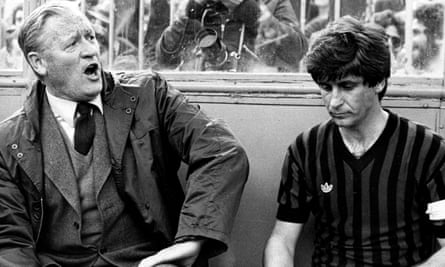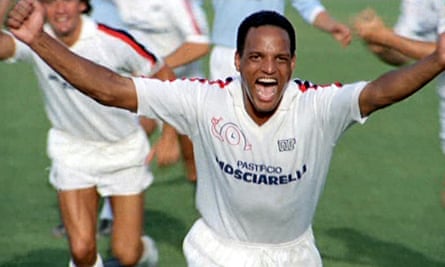B
efore Mike Bassett, there was Oronzo Canà. The former was a fictional English football manager, played by Ricky Tomlinson, who was overpromoted into coaching the national team in a 2001 comedy that became a cult classic. The latter: a fictional Italian football manager, played by Lino Banfi, who was overpromoted into coaching a Serie A team in a 1984 comedy that went the same way.
Both make up some tiny part of my cultural heritage, and yet the truth is that until recently I knew only one of them well. Neither parent actually cared much for football, and the small VHS collection we did have seemed mostly to reflect my Italian dad’s enthusiasm for Goldie Hawn.
Perhaps he saw L’Allenatore nel Pallone, but it certainly passed me by. I came to know it much later, in the pages of Gazzetta dello Sport. If there is one truly striking thing about Banfi’s movie, it is how often it is referenced – even today – by the Italian sporting press.
The title does not easily translate. Taking the words individually, you could make it The Manager in the Football, but to be “nel pallone” also means to be a mess, confused, all over the shop. Acknowledging this nuance, and resolving not to find an eloquent alternative, distributors put out the international version under the even more nonsensical Trainer on the Beach.
There is a single scene filmed on Rio’s Copacabana, but it is hardly integral to the plot. Canà, meanwhile, does spend much of the movie in a state of confusion. He learns via TV that he has been appointed as manager of Longobarda, newly promoted to Serie A, when the club’s owner, Borlotti, names him during a live interview. Not for the last time, Canà faints.
The appointment is a ruse. Borlotti wants his team to be relegated, since the costs of operating in Serie A are more than he can afford. Canà is the perfect patsy: too naive to question what is going on around him but self-important enough to believe he could be hired on the merit of his tactical ideas.
Where Bassett had “four-four-fucking-two”, Canà introduces his players to a “five-five-five”. Referencing the various zonal marking systems deployed by great managers of the era – from Nils Liedholm to Enzo Bearzot – he declares his to be the first ever “bi-zona” (two-zone system), with a group of five defenders and another of five attackers, moving fluidly up and down the pitch so that either can serve as the team’s midfield.

“Amidst all this general confusion, the opposing team will go: ‘Haha! What’s happening?’ And they won’t understand a thing,” the manager declares gleefully. “Us neither,” comes the response from his captain, Speroni.
That contrast with Bassett is not a casual one. The stereotype of English managers in the early 2000s was that they were tactically narrow-minded, prizing passion above all else. Italy was the opposite: a nation obsessed with formations, where every armchair analyst knew best.
L’Allenatore nel Pallone skewered the domestic football culture in a manner that is – especially for 1984 – very well observed. There are gags about match-fixing and ultras, but also more subtle ones about the Italian obsession with rating the possibility of different on-pitch outcomes by offering spurious percentages. (Canà starts out by giving his team a “3.5% chance of making the Uefa Cup and 0.07% chance of winning the league”.)
Some of the funniest scenes revolve around “il mercato” – the transfer market. In Italy, players, managers, agents and club directors gathered every summer in a Milanese hotel to strike deals and deliver paperwork directly to league officials. The elaborately structured trades and co-ownership deals could often seem inscrutable to the average fan.
“Through a series of movements of players to be released I’ve managed to land us three-quarters of [Claudio] Gentile and seven eighths of [Fulvio] Collovati, plus half of [TV presenter] Mike Bongiorno,” declares a triumphant Borlotti at the end of a hard day’s trading – claiming that the latter was added into the deal when Silvio Berlusconi got involved. “In conclusion, Berlusconi got the exclusive World Cup rights. And we got co-ownership of Maradona.”
Canà’s excitement is soon tempered by the revelation that Gentile and Collovati have already been moved on again, and that the deal for Maradona does not trigger for three years. Longobarda’s best two players have been sold in the meantime.
Desperate to upgrade his flimsy squad, the manager heads to Brazil on a scouting mission. It is here that the film descends furthest into farce: an extended series of misunderstandings culminating in Canà being operated on against his will by a surgeon named Socrates (the famous Brazilian footballer of that name was also nicknamed Doctor). At the end of it all, Canà discovers an amateur talent, Aristoteles, who will become Longobarda’s new star.
There is inescapable discomfort at some of the film’s humour. We see sexism, homophobia, transphobia and a crude misunderstanding between Canà and a Fiorentina director over the use of the word “handicapped”. Women’s bodies are ogled by the camera as much as the characters.
L’Allenatore nel Pallone belongs to a tradition of “commedie sexy” (sexy comedies) which were something akin to England’s Carry On movies: grand farces whose humour leaned heavily on slapstick and innuendo. Their popularity peaked in the 1970s, and this film represented something close to the tail-end. Much like those Carry On movies, it could not be made the same way today.

It is also true that the most persistent and targeted mockery is aimed at Italians in general, and football people in particular. And the film does seek, in its clumsy way, to send a positive message about race. Aristoteles is ostracised by his new teammates, who refuse to share a hotel room, but Canà treats him tenderly and does not bat an eyelid when the player embarks on a relationship with his daughter.
For all its flaws (and there were sections I really could have done without) I cannot deny being charmed when I rewatched it. L’Allenatore nel Pallone was a movie of its time, but in some senses also ahead of it, bringing real-life footballers into the entertainment sphere in a way that had rarely happened before. There were cameos from a host of Serie A players, including Zico, Francesco Graziani and Carlo Ancelotti.
Liedholm even provides a post-game interview after his Milan team thrash Longobarda. Supposedly, it was he who gave Banfi the idea to make the movie after they met on a plane. “Without the Canà-Liedholm sketch, maybe there would never have been the Papu Dance,” the Italian journalist Gianluca Di Marzio wrote recently, referencing a viral YouTube collaboration between Atalanta’s Papu Gomez and comedy group Gli Autogol.
Perhaps there would have been no Mike Bassett either. Certainly we would never have enjoyed the spectacle of modern-day managers and journalists teasing one another about whether it is time to try a 5-5-5.


